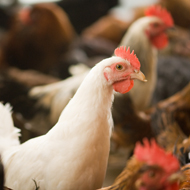
Thirty-day prevention zone introduced in England
The government's chief vet has introduced enhanced biosecurity requirements to protect poultry and captive birds from a strain of avian flu that is circulating in mainland Europe.
A 'prevention zone' will remain in place for 30 days in England. Keepers of poultry and other captive birds are required to keep their birds indoors or take appropriate steps to separate them from wild birds. Prevention zones have also been introduced in Wales and Scotland.
The move follows confirmed outbreaks of H5N8 in poultry and wild birds in several countries across Europe. No cases have yet been found in the UK; the order is a precautionary measure to prevent infection by wild birds.
Chief veterinary officer Nigel Gibbens said: "While no cases of H5N8 avian flu have been found in the UK, and PHE advises the public health threat is low, we are closely monitoring the situation across Europe and have scaled up surveillance in response to the heightened risk.
"As a precaution, and to allow time for poultry and captive bird keepers to put in place appropriate biosecurity measures, we have declared a 30-day Prevention Zone to reduce the risk of infection from wild birds.
"Even when birds are housed a risk of infection remains so this must be coupled with good biosecurity—for example disinfecting clothing and equipment, reducing poultry movement and minimising contact between poultry and wild birds."
The prevention zone has been welcomed by the Poultry Health and Welfare Group, which represents the poultry industry.
Chair Mark Williams commented: "The poultry industry has been liaising closely with Defra to ensure we are best prepared should the risk of bird flu heighten, and contingency plans are in place and under constant review. Most birds can be taken inside their houses within a matter of hours. Where birds like geese and game can’t be housed, measures will be put in place to ensure separation from wild birds."
Poultry keepers are urged to be vigilant for signs of disease in their birds and any wild birds, and to seek advice from their vet promptly if they have concerns.
Recommended biosecurity measures include:
- cleansing and disinfecting clothing, footwear, equipment and vehicles before and after contact with poultry – if practical, use disposable protective clothing;
- reducing the movement of people, vehicles or equipment to and from areas where poultry are kept to minimise contamination from manure, slurry and other products and using effective vermin control;
- thoroughly cleaning and disinfecting housing at the end of a production cycle;
- keeping fresh disinfectant at the right concentration at all points where people should use it, such as farm entrances and before entering poultry housing or enclosures; and
- minimising direct and indirect contact between poultry and wild birds, including making sure all feed and water is not accessible to wild birds.



 The veterinary mental health charity Vetlife is inviting the veterinary community to join it for a sponsored cold-water dip.
The veterinary mental health charity Vetlife is inviting the veterinary community to join it for a sponsored cold-water dip.